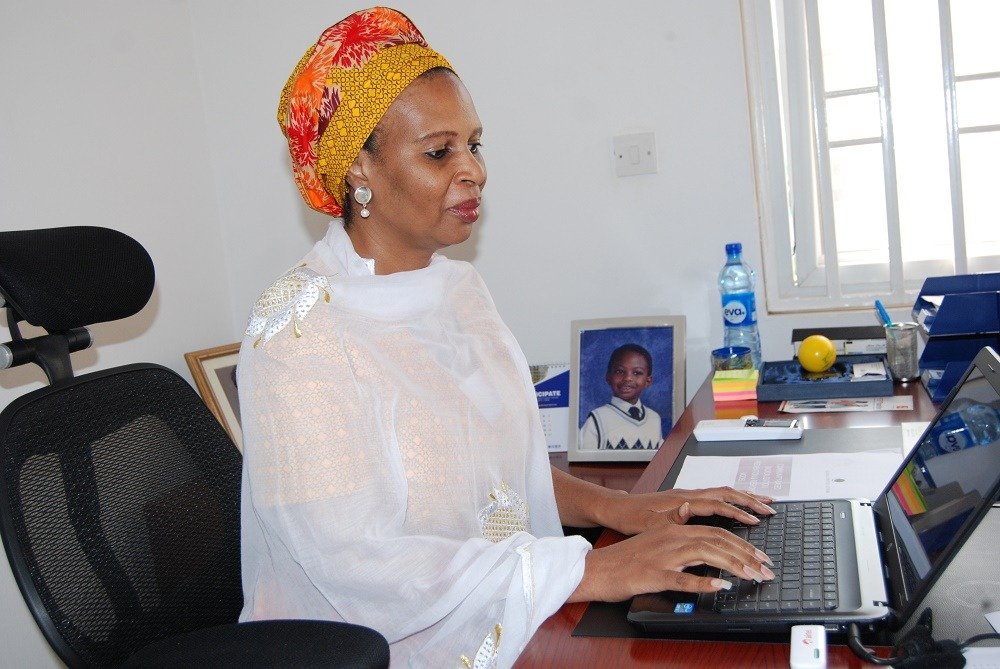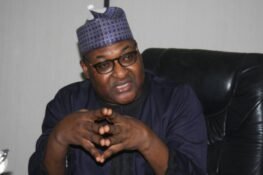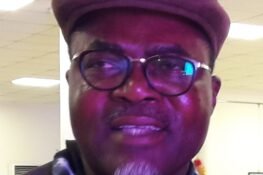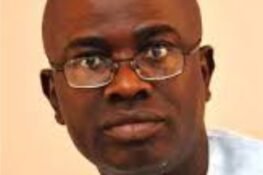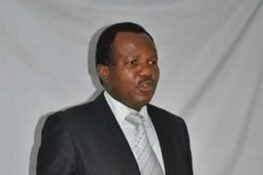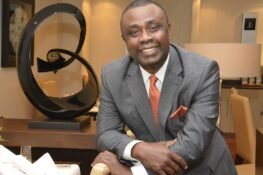Dr. Fatima Akilu, with a Ph.D. in psychology, has more than 20 years’ experience in the field of mental health and psychology. As the executive director of Neem Foundation, a not-for-profit, non-governmental organization, she oversees a one-of-its-kind programme aimed at improving the lives of those affected by the insurgency through building inclusive communities, providing and raising the standards of psycho-social care and countering extremist narratives.
She speaks to The Interview on the special work she and her dedicated team are doing in the terror-torn communities of north east Nigeria. It’s a must read…
Recently, we learnt that one of the rescued Chibok girls, Aisha, went back to her captors; what do you think is behind this kind of action.
Well, I think reintegration must be better planned because a lot of people can come out of a situation where they had been held by terrorists or militants, or even voluntarily. When they come back, first of all, there has to be community acceptance. We found that a lot of communities do not accept them. They actually reject those who voluntarily join the terrorist group because there is still an ongoing insurgency, so there is no peace building, no reconciliation, no forgiveness process: people are still hurt; they are still angry; they are still contending with attacks almost every two, three, four weeks by Boko Haram, and then you tell them to accept these people who are, in essence, former militants. It is very difficult. So, the rejection and the stigmatization of the communities do not help. And also, sometimes, they find it very hard to reintegrate into the society. Those women who joined Boko Haram, especially Aisha and some of her cohorts, they married Boko Haram commanders voluntarily; they enjoyed a lot of power and wielded a lot of authority within the group. So when they are back in the community, they lose all that – loss of status. And psychologically, it might be very difficult for them to adjust to that. Again, when they came back, it might be difficult for them to reintegrate economically. They might not be able to sustain a means of livelihood and so they find themselves struggling, and not able to support themselves. So, they are a number of factors that may make some of them rejoin this terrorist group. And we cannot discount the fact that some of them do love their husbands and that could also be a reason that makes them rejoin them.
Are there actions you think the government and the society can take to prevent such from happening?
Well, I think there are several things that we should so as a country and as a society. First of all, I think there should be an integrated, widespread de-radicalization programme to encourage them to leave the group, but when you encourage people to leave a group where some might be benefiting from, you’ve got to replace it with something.
Some of them probably have been radicalized by their association with the group. Some might have been coerced to join the group. Nevertheless, all have experienced a lot, including many incidences of psychological trauma. So, you’ve got to deal with the trauma they experienced in captivity. You’ve got to deal with the reasons that made them join the group in the first place. And the reasons are very complex. Ideology is only one. In many cases, it is not the larger component of why people join these radical groups. A lot of conditions make people join. Some of them are matters around marginalization, lack of social inclusion. Some people join because they are looking for adventure and they are looking for a sense of purpose. Some people truly believe that, that is what religion is all about. Some people join because their friends or brothers are in the group. And then you have others who join because the group has given them small economic incentives. So, it’s a myriad of reasons why people join radicalized groups. So, we must look out for the conditions that make it conducive for people to join radical groups and try to eliminate as many of those conditions as possible. Most of it is lack of good governance, actually.
So, once you’ve looked at overriding reasons people join, then you look at the global reasons and the individual reason: sense of self, search for meaning. I think we need to address those conditions that make people join such groups; we have to work on disengagement programmes to get them to leave the group, having understood the conditions that made them to join in the first place. And when you encourage them to leave the group, you have to offer them a better alternative. You can’t ask them to return to the same conditions they left. Some will need de-radicalization, not all. Some of them were co-opted into the group, some of them joined for social reasons, some for economic reasons but for those who joined for ideological reasons, there is got to be a total disengagement from the belief system that led them to join. A lot of that could be done by teaching them what Islam really says. In my own experience working in an environment where there are hundreds of Boko Haram members, the understanding of religion has been very poor and shallow among the foot soldiers. Their commanders, while they don’t have a good grasp of Islam, are very good at manipulating them.
To me, religion is the one of the most powerful recruitment tools for these groups. You know, once you say, ‘God says…,’ a lot of people don’t question. A lot of people who follow these groups don’t even have critical thinking skills or logical skills to say, ‘Hang on a minute, how can the same God who says that He is love, peace and justice be the same God to tell us to kill an innocent person? That doesn’t make sense.’ So, you have to have elements of critical thinking in your de-radicalization programme; you have to address the psychological needs of the people. So there should be elements of psychology. What you are trying to do is to rebuild the old person, so you’ve got to give them other things like sports. In our programme, arts work very well. You’ve got to give them skills and you’ve got to make them fit into the purpose of the society you want to reintegrate them into. De-radicalization is a very, very long-term; it’s hard, you need a whole cadre of specialist trained staff to be able to do it, across multiple disciples working as a team.
Do we have the capacity for this?
I think that we have a tiny, little de-radicalization programme, but certainly not the scale for the country to make impact. We will need years to acquire these skills to train people. But I don’t think it is an investment that Nigeria can afford not to make. What is important is investing in these solutions; that is stage one. Then you’ve got to invest in reintegration; reintegration has many components. You are reintegrating them back into the society. Often the society doesn’t want them anymore; they have rejected them. So, you’ve got to have a two-tier track, where you educate the society to forgive and take them back. You have to remember that love is important to the people who have committed so many atrocities as members of the terrorist group. If they go down this route, you are taking them into a nice facility, de-radicalizing them, giving them a lot of attention, education, skills, sports, engagement with imams, clerics. It’s a delicate balancing act to be able to get the community to reintegrate them; but without the support of the community, you cannot reintegrate them. So, you’ve got to provide education for those who need it, especially for those of school age. You’ve got to provide them with skills and match the skills to jobs, because if the training is going to lead to nothing, then you are leaving them at a disadvantage and also they might have the desire to rejoin their group. You’ve got to also make them feel like part of the Nigerian project. One of those things we found clearly was that people lack the sense of identity; they do not identify with the Nigerian project. They identify with their religion and ethnicity. Therefore, they operate within these tiny religious and ethnic enclaves; they had no understanding of the country beyond that. So, you’ll find it easy to manipulate them, using those same things – religion and ethnicity, because their worldview is very myopic. In Nigeria, you see different ethnic issues springing up because of this. It is not particular to the north east. So there is a big responsibility if you want to do de-radicalization, re-engagement, reintegration; you’ve got to address this at the national level. You’ve got to make everybody feel included. You have to address the issue of social justice; a lot of people do not have access to justice, especially the poor people. All these build up and make people feel annihilated. So you have to come up and say, ‘Look, I can give you your brotherhood. I will take care of you. I can fulfill your psychological needs.’ There is a lot of work to be done.
Talking about forgiving in the community, shouldn’t Aisha’s ordeal in the hands of the terrorists qualify her for forgiveness?
Aisha was not a victim: she was not abducted; she voluntarily married a Boko Haram member. She was captured by the military and reintegrated into the community, but she went back to meet the Boko Haram group.
Do you see the girls ever reintegrating fully into the society?
I see a lot of them that have been reintegrated back to the society. The difference has to do with their association with Boko Haram. You know, we have victims and we have perpetrators. In the instance of Aisha, she was not a victim. She was of the age of consent when she joined them. Boko Haram had lived in her village. She knew who they were and what they were doing. So she, out of her own volition, chose to join them. But then we have thousands of others who were abducted and forced to join. Once they are in the group, some remain victims and some will become perpetrators. So, it’s very difficult to handle. But in my own opinion, I think that all of them who were captured should be treated at some level as victims, because at the point they entered the group they didn’t have a say. Some of them were coerced, some of them were brainwashed into committing terrorism. But that does not mean to say that there shouldn’t be a system that makes them face justice. So, to me, a model I feel could work is that all those who are victims should go through de-radicalization and reintegration programme and reintegrated into the community. Then you have the architect of the group’s ideology, the commanders, I think it is difficult to say that those who have committed such atrocities should not face any justice. So, as a country, we’ve got to decide how we treat those higher level members of the group. I am not against national amnesty if it is tied to two things: they going through a programme and they atoning for their actions, and also if the communities that have suffered from their actions are included in the programme.
So, if these two things are not done, you don’t think the amnesty will be sustainable?
No, it is not that I don’t think. There are different models of amnesty. I am just talking about one model, the way I see it. I think that victims must be acknowledged, what they been through must be recognized. There must be psychological therapy for the victims.
Can you break down the psychological services you render for a lay man out there?
Basically, what we do is that we work with victims and perpetrators where we address psychological issues. Most of the people that have had contacts with Boko Haram, be it that they have had their homes or communities destroyed, or they were abducted and taken to Sambisa Forest and taken hostage by Boko Haram, some have severe trauma, some have mild trauma, some have moderate trauma, but most of the people have some level of trauma. Some have post-traumatic distress order. So, it has had a debilitating impact on their ability to move on with their lives. So, some of them are stuck psychologically. We have a team of psychologists, and where we work with them in communities, we offer services over a period of a month. We address issues that have to do with anxiety, depression, and post-traumatic stress disorder. Basically we deal with cases of psychological disorder, insomnia. We really teach them coping skills; how to cope with their experience. Some of them might have committed atrocities while they were with the group. That’s quite difficult to live with, so we teach them how to cope so that they can move on with their lives. This is what we do at several communities. At a time, we see about a thousand people in a month. So, every two months we go back to the community to see how they are coping. We isolate those who still need psychological support and we continue to give them psychological support. At the end of the month, if there is anyone who needs more help we continue to give them help. We also opened the first, I believe, Psychological Trauma Centre for Children in Maiduguri. We provide trauma therapy for children under three. We help quite a lot of children who are referred to us, who have a whole range of problems.
What kinds of problems do these children have?
A lot: insomnia – inability to sleep; some have behavioural problems; some have become mute as a result of the trauma; some have anxiety, panic. There are a whole lot of them. At least we have that service that we provide to children.
Like how many children you have seen so far?
I don’t have the number but it’s certainly a lot of them. Every month we also run one adolescence group from 14 to about 19.
What has been the response so far from the communities?
It’s been overwhelming. It’s been a real surprise to us. I’m a psychologist, as you know, so this is very dear to me. Even when I was in the office of National Security Adviser, I had always felt that one of the tools we needed to have, in terms of rehabilitating people and preventing further violence, was to address the psychological needs of the people. I knew that the need would be great as insurgency diminishes, but I wasn’t able to do it when I was in the office, but I’m grateful now that I am able to concentrate on this work.
For such delicate work in a terror-ravaged state like Borno, how many of such people as you are involved?
There are four psychologists in Borno. The whole of Borno State has eight. Our agency has four and the other four are from Federal Neuropsychiatric Hospital. So, it’s overwhelming. We hear people crying because they can’t get services, just because we do not have enough staff. We always tell them that we don’t have money to give them; we don’t have food to give them, we don’t have any clothes, but once they have had few sessions, the responses have always been: ‘Nobody has been able to deal with the things that are in my head when I close my eyes; this is the first time that this is being addressed and it is more important than any food you give to me: I can sleep at night; I don’t have high blood pressure; I don’t have palpitation; I am not scared; I am able to focus on rebuilding my life.’ So, those are the kinds of responses we have been getting from people.
So, the community actually appreciates the work you are doing?
Yeah. In every community that we go, we do sensitization everywhere we go, explaining what psychological services are and the problems we deal with. The Ulamas, the community leaders, have been so helpful. They give us space; some people give us their houses because we do groups of eight to 10 people. We have like five groups per day in a community, so you need a safe place to work. So they give us a place to put our tents. We have heard people say, ‘I couldn’t do anything, couldn’t sleep until I had counseling.’
We had a case of a woman who had eight children. She was so traumatized that she could not pay them any attention, but after a month of counseling she went and got her children back. We had another case of a woman who had a four-month-old baby and was stepping on the child, screaming ‘die, die, die’. She got so overwhelmed with her issues and we had to bring her in for attention and explained to the community that she was going through trauma, and not that she wanted to kill her child. Once we finish with every group, we form what we call community service. We tell them that they are family; we say to them, ‘This is your therapy family, and after we leave you, you will continue to see and give each other support’. When we return to most communities, we’ll see that they have continued to meet and give each other support, which is what we want, for the sustainability of the programme.
I wish we could render this service in all the states in the north east. I wish, but we don’t have the resources to do that because it is labour intensive.
I even want to ask you, how do you get funding?
When we go to communities, we do assessment of individuals between 40 minutes to an hour to understand their psychological history, and based on that, we then place them in groups. We group people sometimes by experience or age. In some communities, they have mixed groups where men and women don’t mind sitting together, so we create some dynamics. In some communities, we have men-only groups. Once we group them, each group meets every week. On Mondays we see five groups; we see another five groups on Tuesday and the Monday group will come back next Monday. So, it’s labour intensive. And because we don’t take more than 10 groups – because it is not conducive for therapy, so it makes the work very intensive. And we have 25 counselors that we train every week. The counselors are at the level where they can carry out counseling by themselves. We also have a training school we set up in Borno where we offer classes every week. So all counselors get the theory and the practice and they know that they have a role to play. Based on that, we cannot extend beyond a thousand if we want to offer them quality services.
How many communities have you been to?
I can get the number before you go. But I do not have it now. It’s a lot.
How are you getting funds?
We have different donors who are interested in the work we do.
Is the government part of those donors?
No. Actually, nothing from the government. But luckily we have had interest from a few donor agencies that have come and seen what we have done and wanted to support this work.
So, the Nigerian government does not think this is important?
I don’t know. But, certainly, we have not got any support from them.
Have you ever looked for support from them?
We did have conversations with PINE (Presidential Initiative on North East) before it became PCNI. To be fair to them, they contacted us and were interested at one point but I don’t know what happened.
The first time you met girls after captivity, what was it about them that struck you the most?
There are a couple of things. You know that I ran the programme for the very first set of victims that came out of Sambisa Forest. I ran the programme for 318 in Kaduna, those were mostly women and children. What we saw was that when they came back, they were in state of shock. They had a lot of physical health problems. They had severe malnutrition. So we really dealt with those problems first. Once we stabilized them, then we looked at psychological factors, and then we looked at social factors. They had experienced tremendous hardship, and the group that held them were very cruel to them. The children were beaten. We had a five-year-old that had been repeatedly raped that her pelvis was almost broken. We had to deal with such kinds of issues. I think in the period that I ran the programme, we had about eight or nine babies that were born. So, a lot of the girls had been impregnated.
But those were not the Chibok girls…
Yes, but the experience was not different from the Chibok girls. Sometimes I feel a little frustrated that there are thousands who have been through identical experience. Well, I understand that the Chibok girls are meant to symbolize a larger problem. Those thousands I saw in Borno State were not getting resources targeted in their direction, yet the Chibok girls got tremendous resources from the federal government, such as offers of education and counseling, but there are thousands much younger than Chibok girls out there and I wonder what the difference is. I’ve met so many that were also kidnapped from school. Circumstances were not different but the only thing is that the Chibok girls’ case has been internationalized. As a country we ought to be able to give equivalent attention to all our citizens.
What would make a man rape a five-year-old?
That’s a good question. I spent three years working on pedophiles. We have certain people who, unfortunately, have an attraction, sexual attraction, to children, and a lot them is cognitive. So, when they think of children, they do so in a sexual way, almost as normal people would with adults. For some, it’s part of their fantasy; it’s part of their deviant behaviour in which they fantasize having sex with children. In my experience, people that are pedophiles, usually, are life-long. Usually, they don’t stop fantasizing and of having sex with children. So, in some countries, what they do is to lock them away for life. Some they put them in treatment centres and some they keep them away from children. But we don’t seem to take it seriously and it’s becoming so rampant in our society. Now, people are doing it openly; you hear about someone raping his neighbour’s five-year-old daughter. In this particular case, I don’t know if the Boko Haram person was a pedophile but they were raping them all as a form of control. Some people rape children but they are not pedophiles but as a form of power and control.
Having worked with the affected communities for sometime now, what in your opinion are the three major takeaways from the whole experience?
I think that the support is not holistic. I think that there is a lack of recognition that we can do multiple things at the same time; we can do healthcare, nutrition, we can address housing and psychological needs. It is also an important pillar because we can rebuild houses, hospitals, schools but if the person is broken, they are not going to enjoy those schools and hospitals you rebuild. You’ve got to rebuild people.
When I work in a community, I feel that a lot of communities feel neglected. There is not enough said about what they have gone through in terms of using it as a mechanism to build peace. A lot of communities affected by the insurgency are left to cope on their own with their anger, dis appointments and all they have witnessed. There is an expectation that this conflict will just end naturally and people will just go back to these new shining cities and all that. We forget that there are families of perpetrators and families of victims that come from the same community. So far, there is no real platform for long-term peace, no mechanism of forgiveness and healing. So, I see those as problems. I see multiple gaps where different agencies are doing different things or replicating each other’s work and we’ve still not been able to come back to provide a synergized response to the conflict. That’s what I feel.
Do you see this insurgency ever coming to an end?
Yes, absolutely. I think we’re getting to a place where we will see an end to the military presence. But I think when it comes to the destruction of lives and livelihoods of people, we have got to rebuild foundations. There must be comprehensive plan to take special care of CAAFAG (Children Associated with Armed Groups and Armed Conflict). We have a lot of them. We are starting a programme in July in the communities. Most of them who joined Boko Haram were abducted. They play all sorts of roles, from intelligence, spying, messengering, etc. These kids are back in our communities. There is no plan to reintegrate them properly into the society. A lot of them are on drugs, most of them are out of school. I see that we have potential problems. That’s why I said, ‘yes, we are seeing the end of the conflict but we are seeing the beginning of massive problems in the peace building with these communities if we don’t do proper comprehensive plan. So, I see a lot of social problems ahead.
Why does it seem the government is not looking at all these issues?
Well, you see, I am not in government anymore, so I cannot say what the government is or not doing. There may be a comprehensive plan that is yet to be unveiled. I am hoping and praying that, that is the case.
Do you believe those in the north east will ever experience normalcy as we all know it?
Absolutely. I started going to Borno in 2012. Already, it has massively improved. You see a major difference. Normalcy has returned in major aspects of the state. There are still some no-go areas, but not many. Something so amazing is the resilience of the people. People are going on with their lives, trying to reinstitute things that they used to do before. They have really dealt with what they have been through with such courage and resilience. Not only that, they have opened their doors to others in need. I’m talking of Maiduguri where I spend most of the time. I don’t think there is a single household in Maiduguri that does not have an IDP that they are supporting with food and shelter. They have really rallied together in a way that is impressive to see. So, they need more support to ensure that all the problems that I listed are actually incorporated into a holistic plan to tackle the issues. Now, there is PCNI, I know that they have got the north east commission and I hope that there would be a collaboration to solve the problems. We have seen in other countries that have gone through conflicts that it cannot be addressed overnight. Policies must change, as the conflict must have made many people not want to live together again. But that doesn’t mean we should not do the hard work to bring them together. South Africa did reconciliation. Also Rwanda did reconciliation after the genocide and they have come back together. So, Nigeria must recognize that we need to do that kind of work to have that long-term harmony.
You worked in the NSA office during the last administration; what do you think this administration did differently to record the success we have seen so far in the war against terror?
In terms of training, equipment and command, it seems they have an attitude and philosophy that seems very positive at the moment. It seems the military has been energized. I also think it is the leadership. I think that for you to succeed, whether militarily or in other aspects, there is supposed to be the political will, and it seems there is political will in the military to end this conflict.
With the benefit of hindsight, do you think this whole carnage could have been avoided?
Well, things would have morphed if we had done things differently. When I studied the Mohammed Yusuf tape, I began to understand that, very early on, Jihad was always on the cards for him. I think a lot of people believe that Boko Haram picked up arms against the state because of what happened to Yusuf and because of their current leader, Abubakar Shekau. But I think, from Yusuf’s own words, it was always on a trajectory towards Jihad from the early stage. I think the idea was always to form a religious enclave of their ilk and get a large followership. I don’t know if it was within Yusuf’s plan to take territory, but certainly that was his path. I think in the early days a couple of things happened; one, the fear of speaking out when people got to understand that the group had begun to preach this form of religion that was alien to people of the state and Nigerians in general. I think they were treated with kid’s gloves which did not help. I think the state’s response mechanism was not rapid enough. I think the role of the traditional institutions in early conflict resolution is diminished as government wants to do everything. We’ve got to go back to finding platforms to address grievances, dissent, hate speech very early. So we need those mechanisms at the grassroots to tackle this.
Looking at what happened in the north east and what is happening in the south east with the issue of Biafra, what do you think government can do to prevent another situation like what we have experienced?
I think we must be honest. We have got to be honest with getting to the root of conflicts. We cannot resolve conflicts by fire brigade approach. Why is there so much agitation among youths across the country? Why are the youth so marginalized in the Nigerian project? We look at these issues from ethnicity and religion, but it’s far deeper than that. There is a sense of anomie, a sense of disengagement from the Nigerian project. So how do we get the youth back on board? How do we get them to identify with the Nigerian project? There are so many things that we have done wrong. For example, we visited street children in Zaria as part of our programme – 150 of them, not a single Christian. They were all Muslims. Some of them that are going to school, they don’t go to school with people of another religion. We asked them if they know the Bible, it was like we were asking them to commit blasphemy. So, there is a lot of ignorance and we fail to understand that the way we live as a society is causing more separation. What we have now in a lot of states is that people live within communities of people that are like them, so your children go to the community school and they don’t mix up with others. That was not how I grew up. I grew up in a different Nigeria where we lived with people of different tribes and it was never an issue. The main identity while I was growing up was Nigeria. Now if you ask Nigerians who they are, they will tell you that they are Igbos or Hausas or Christians or Muslims. Those are some of the things that are happening at different levels. You are in a state and you are told that you are not an indigene in a state you were born in. You are Igbo, you are born in Jos and someone comes to say that Igbos can’t stand for public office. We’ve got to address this issue of disenfranchisement of our own citizens. We’ve got to address this issue of extreme poverty that is growing by the day. We’ve got to address this issue of education that is not fit for purpose. A lot of young people come out of school and they can’t think. We have moved to a point where everybody must have a certificate. You cannot get many jobs in Nigeria without certificates. Why do I have to do some of those jobs with certificates? There should be entrepreneurship class. There should be apprenticeship class. If I want to be an engineer, why can’t I do that through apprenticeship and learn on the job? So, there is a lot of frustration among the youth. We have so many youths who have nothing to do. So, a lot of youths have this sense of hopelessness. All those things must be addressed. There is a lot of work that must be done at the foundation.
You also write children’s books; what’s the fascination with children?
You see, my children were born abroad. They spent their first six and seven years in the U.S. When they were in the U.S., they had varieties of children’s book they read. They read books that had Asians, Americans and white people in it. And when we came back to Nigeria, they couldn’t find any book with people that look like them in it. So, that was a concern for me at that time. Then an opportunity came; I had a job as head of communications for MDGs. I had to write communications strategy that addressed all Nigerians, including the children. So I knew that I needed to find a way to communicate the MDGs to children. I thought one of the ways to communicate that to them is to write a book on each MDG. So, I wrote eight books, one on each MDG. I enjoyed the process after I wrote the books. So I started writing and publishing children’s book.
Are you still on it?
Yes, I’m even in the process of writing three books on almajiri children right now.
What kind of response do your books get?
It’s funny now when I see a lot of young people that know me because of one particular book: Zahara and Koko. I wrote the book, Zahara and Koko, for three and four-year-olds. It is my most popular book. It’s a picture book, alphabet, colours and numbers. Young people seem to resonate with Zahara and Koko, so it’s is really good.
How would you rate the quality of the mental health of an average Nigerian?
What I know is that Nigeria is not an exception when compared to other countries in the sense that mental health is a big problem all over the world, so I don’t think that Nigeria is an exception. The problem with Nigeria is that we don’t have enough mental health practitioners, but I am happy to say that more and more young people are studying psychology in school, more universities are offering psychology. When I was young, it was only Ibadan, Ife and Lagos that offered psychology. Most parents do not want their children to study psychology because they have very little understanding of mental health care. There was a stigma attached to mental health and people would rather go to their Imam or pastor for counseling or help. But that’s changing now. People are now openly admitting that they have depression, anxiety and other psychological issues and people are seeking help. What we would like to see is a framework for psychology – which is something we are working on – that will achieve two things: define what provision of care should be in Nigeria and who should be a mental health care provider; what kind of mental health would work for us, what the training should be and, maybe, should we license mental health practitioners so that we can know what kind of quality care we are getting. We hope that if there are such frameworks, it will encourage universities to offer more spaces for psychology and for government to invest. I mean, psychological health care is now part of the mental health bill that was passed in 2015, I believe, and I think the military has its own policy for psychological services and mental health. Government also has done some work through the National Primary Health Development Agency. I would certainly like to see a mental health practitioner in every primary health care centre across the country so that people can assess care within their communities.
Tell me about your aspirations
That’s an interesting question. I am not quite sure how I can answer.
At least, I have an Idea of what you are doing and some of the things you have done. There must be some things you still aspire to achieve.
I think my current goal and what I am working towards is to be able to work across multiple platforms: government, NGOs, and other partners to prioritize the provision of psychological services in the country and make it more mainstream. I will love a day when whoever needs psychological help, in the same way they need help for medical intervention for physical health problems, can walk into a hospital and there would be somebody who understands their needs and is able to provide them care. I think, for me, my goal now is to continue to work to expand the provision of care services because that is the only thing I do, and also work with victims of insurgency in other areas. We have our big education platform where we are pushing for the creation of (xxx1:016) curriculum which we are trying to pioneer. What we are saying is that education should not be linear. The whole purpose of education is to teach us how to think. One measure of education that is so important is for your children to be able to think, and not only that, but to be good citizens, but we don’t do that anymore as young people. I would like to see more of our youth being mentored in service.
What inspires you?
I think what inspires me is seeing people succeed against all odds. My mum was widowed at age 33. She’s got a lot of children even though she was educated. She educated all of us and achieved a lot in her own right. She was a politician, a philanthropist, a businesswoman. That inspires me. There are also a lot of people who have achieved a lot because they have vision and determination. One of them is Amina Mohammed who was my boss. She is UN deputy secretary-general now. Not only has she succeeded against odds (she worked in a male dominated area and held her own), but I have seen how she mentors others to succeed. These are the kinds of things that inspire me; people who always look back and see how they can make a change in someone’s life, even if it’s one person.
When you are not involved in foundation activities or writing children’s books, how do you keep busy?
Well, I am a mother, I have children and I’m also a wife, so I think family is very important to me. I read a lot. I find it a bit frustrating now that in Nigeria things have changed so much that books are not as accessible as they used to be. I mean, it’s changing now because you can order one online for those who can use the internet, but before we had so many books. We had Africa Writer’s Series; we had books all over. You could just go down to book stores and pick any that you want, but now book stores are closing everywhere. I also like to travel and see different places. I like to travel to see how people live in different places of the world, to understand different societies and different ways of life.
